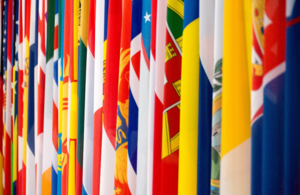Progress report on the OSCE Gender Action Plan: UK statement
Delivered by Nicola Murray, Deputy Head of Delegation, at the OSCE Permanent Council on 23 July 2020.

Thank you Ambassador Yrjölä for presenting this Report today and for assuming your current role. We take this opportunity to re-iterate the UK’s full support to you during this period. We also thank OSCE executive structures and field operations for their contribution to advancing gender equality in the OSCE.
The report clearly shows the progress made in the last three years. But it also shows how far we still have to go. Alongside concerns over backsliding since the outbreak of the COVID-19 pandemic, the Report demonstrates the need for sustained and increased commitment to achieving gender equality. The series of webinars hosted by the OSCE’s Gender Section highlighted worrying trends, particularly in relation to violence against women and girls, including on-line harassment.
This year, as we mark the 25th Anniversary of the Beijing Declaration and Platform for Action, and 20 years since the adoption of UNSCR 1325, we must recognise and ensure that gender equality is integral to all that we do. We have OSCE tools at our disposal, such as the toolbox on the ‘Inclusion of Women and Effective Peace Processes’.
At the OSCE, strong and accountable leadership is essential to progressing gender equality and ensuring that gender is mainstreamed into all activities. There are some good examples of this, including in the activities of the field operations. The introduction of mandatory gender-responsive performance objectives for all supervisors would be an excellent next step. We also support the Office of Internal Oversight’s recommendation on the provision to all staff of the Intensive Gender Training organised by the Department of Human Resources.
The OSCE’s strategy for achieving gender parity by 2026, including at senior levels, is an important step to achieving gender equality. As your Report states, it is important to create an enabling environment to attain this goal. Although progress has been made, women still account for less than 30% of senior management staff at the OSCE.
We appreciate that there has been some improvement on gender parity in OSCE events, but women continue to be under-represented. This isn’t just about the numbers. Gender balanced panels contribute to more informed discussions and to more informed policies.
On the serious issues of sexual exploitation, abuse and harassment, we welcome the OSCE’s ‘zero tolerance’ approach. We recognise that actions have already been taken in this respect and that follow up work to the UN-led Safe Space Survey is continuing. As the OSCE looks to strengthen its policies and implementation mechanisms on preventing sexual exploitation, abuse and harassment, it will be important that the organisation has the necessary processes in place and that these are in line with international best practice. It is the responsibility of all of us to adopt a zero tolerance approach to sexual harassment. We need to foster a safe space for staff in the OSCE and within our delegations to raise concerns, including through consistent messaging and action by senior leadership – Ambassadors, Heads of Institutions, and others.
The landmark survey on the Well-Being of Women in South East Europe in 2018 demonstrated the shocking prevalence of sexual violence against women and girls. And, with the increase in domestic violence that we’ve seen globally since the outbreak of the pandemic, it is even more important that we fully implement the commitments we made in the Ministerial Council Decision of 2018 on Preventing and Combating Violence against Women. We must make the prevention and redress of violence against women and girls a key part of COVID-19 national response plans.
In concluding, we reiterate our appreciation for this Progress Report and the recommendations contained in it. We would also like to thank the OSCE’s Gender Section for their continued hard work. We look forward to a sustained and increased momentum on gender equality over the coming year.